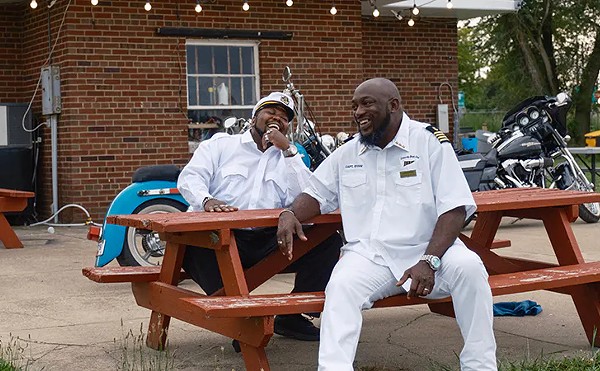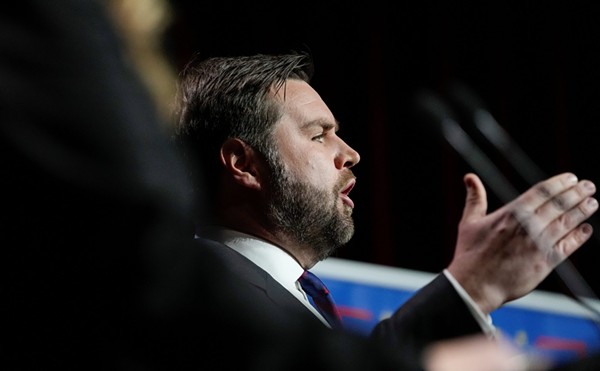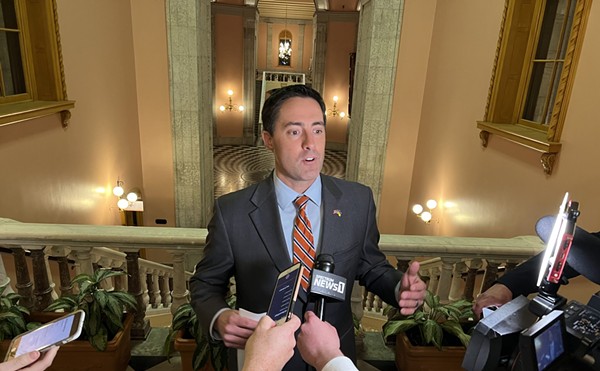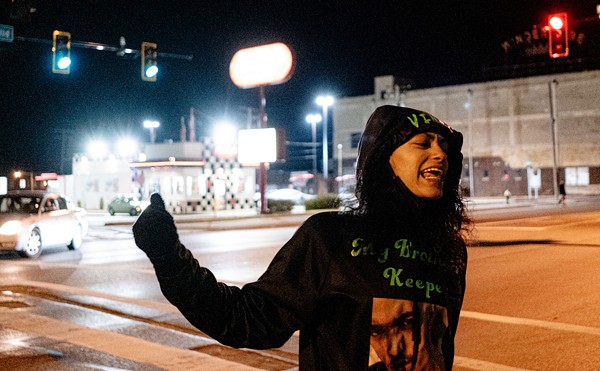Not that fans care. Their eyes fix on the dirt -- the half-mile oval where the Battle of Lake Erie is being waged. Among the harness track's richest events, the $150,000 race has drawn seven of the country's top pacers.
The horses hit the stretch doing 35 mph, their drivers whipping them toward home. A few fans mimic the move, thwacking thighs with rolled-up programs.
A horse named Peruvian Hanover flashes first across the finish line by a half-length. Scattered cheers go up among lucky gamblers. The rest let their betting slips flutter to the ground, the confetti of losers. The buzz dies. Driver Jim Pantaleano does nothing to revive it in a winner's circle interview.
"The horse was just tremendous," he says, his voice dull as a dial tone.
Pantaleano still has three races ahead of him -- juicy sound bites rank low among his concerns. Yet his bland manner seems to fit the crowd's mood. If in recent years the Battle surged with electricity, tonight it suffers a brownout. There's pomp, there's circumstance -- but something's missing.
So says Claude Starks, a track regular since the late '60s. Gray of hair and wise in the ways of the harness game, he's the professor of Northfield. What's missing, he says, is one man.
"Walter Case ain't here."
The driver some consider the most gifted ever to sit in a harness sulky is staying at a Red Roof Inn in Salem, New Hampshire.
"I'd rather be there," says Walter Case Jr. "It's not fun to pack up and move 600 miles away."
Even less so when you're resigned to racing at Rockingham Park, about two miles from the motel -- and a good 15 lengths from fame.
Over a 26-year career, Case has won 11,027 races, second all-time to Herve Filion's 14,890. A three-time driver of the year, he has set dozens of world and national records while earning $43 million in purses. He's the fizz in a club-soda sport, a guy who stirs interest by donating his night's winnings to fans, giving away whips to youngsters, cracking jokes in the winner's circle.
Which only makes racing in Nowheresville that much more depressing. Case wound up there after ending a four-year run at Northfield Park, his exit falling somewhere between forced march and self-imposed exile.
Facing a possible six-month suspension from the state's racing commission for his habit of kicking horses, he chose instead to forfeit his Ohio harness license. In exchange, the commission wiped his record clean and agreed to refrain from advertising his misbehavior to other states.
But as Case concedes, his reputation for wandering feet precedes him, regardless of where he races. The violation occurs when a driver slips his foot out of a stirrup to brush a horse's leg, contact that can startle the animal into quickening its pace. Most often, it's seen as a minor sin -- unless the driver has amassed 11,027 wins and keeps getting busted. Then the stubborn habit becomes a millstone, no matter how much he swears it happens without his realizing it.
Case, in fact, may be the most frequently penalized driver in harness history, drawing hundreds of fines and suspensions. He's also a recovering alcoholic and cokehead -- addictions that got him banned from racing in New York and New Jersey. He's a leper to fellow drivers, who accuse the industry of favoring him even when he runs afoul of the law. The latest incident occurred last month, when Streetsboro police arrested him after his wife alleged that he threatened her. He faces charges of domestic violence and violation of a temporary protection order.
Says John Mossbarger of the Ohio Harness Horsemen's Association: "He is this sport's Dennis Rodman."
If it weren't for his losing about four years of track time to suspensions -- and going AWOL on race night hundreds of times -- it's likely that Case would own the career record for wins. Then again, given that he has burned more bridges than napalm, the fact that he's racing at all suggests the depth of his sport's malaise.
Truth is, were harness racing in better financial health, Case might be out of a job. But the sport has seen its popularity nosedive over the last two decades, done in by race-fixing scandals, an inability to attract new fans, and a Roaring '20s image in the age of extreme sports. If the word "sulky" pops up on SportsCenter, the topic is apt to be Ken Griffey Jr., not horses.
Across this barren terrain, Case remains a rolling dollar sign, able to deliver for owners and trainers while putting butts in seats. Northfield officials claim Case's presence boosted betting totals by $100,000 to $150,000 a night. Handles exceeding $1 million, once uncommon, became routine after his 1999 debut.
Such drawing power feeds speculation that Ohio will take the 42-year-old Case back before the year's over. But state officials downplay the prospect, insisting that he needs to prove he can keep his feet in the stirrups before anything happens.
So far, he's struggling. Three days into his stint at Rockingham, he received a nine-day suspension for kicking. His legal woes in Ohio apparently caused him to miss his rides last weekend, and track officials doubt that he'll return. If he burns his chance at a low-end track in New England and other states spurn him, insiders believe that more than a career could end.
"The man is obsessed with racing," says Jay Bergman, editor of Sports Eye, a New York paper considered the industry's bible. "Without it, I look at suicide as the next thing."
Longtime racing observers say horses respond to Case's hands as if God himself held the reins. "There's something in his feel that makes them want to go faster," says Bob Heyden, the statistician at New Jersey's Meadowlands Racetrack, where Case raced in the mid-'80s. "Walter could wake up a dead horse."
He's had the touch since youth, having grown up next to a harness track in his native Maine. Preferring racing programs to textbooks, he dropped out of school in 1977 and earned his harness license at age 16.
The phenom made pupils dilate as he scorched the New England circuit, later graduating to mid-level tracks in New York and New Jersey. Soon enough, Case wanted a shot at the Big M -- the Meadowlands, the major leagues of harness racing. The competition would feast on the fresh meat.
In 1983, Case ranked second in the country with 429 wins. The next season, his first spent primarily at the Meadowlands, his total fell by nearly half. Though his purse earnings swelled from $700,000 to almost $2.3 million -- drivers receive a 5 percent cut of what they win -- his ego shriveled. He numbed himself with blow and booze, downing half a case of beer a night.
"Losing got to me," he says.
So he ditched the Big M in 1987, racing for the next few years in Chicago and Maine before migrating to New York's Yonkers Raceway in 1990. The same year, he checked into rehab for a month and vowed to stay clean. But by then, the plot line of Case's career already had turned into a closed loop: Win a lot of races. Get suspended. Promise to make amends. Repeat.
"When you're that good that young," Bergman says, "you attract a lot of people -- and not always the right kind. The guy's talent was so far ahead of his maturity."
In 1992, Case posted 843 wins, then a world record; he also sat out 15 days for refusing to take a drug test. The next year, he tested positive for cocaine at Yonkers, resulting in a four-month suspension and another stay in rehab.
Case again would emerge as the boy who cried sober. "I don't want to be the way I was," he told The New York Times.
He wasn't -- he got worse. A DUI conviction in 1994, his second in five years, brought another suspension. Two years later, after he failed a drug test, Yonkers drilled him with an "indefinite" suspension that lasted 13 months. He retreated to Maine.
Heyden remembers talking to Case as the 1998 season approached. "I said to him, 'Just do it once. Just forget everything else and just put up an incredible number that no one can ever take away from you.'"
The number Case put up -- 1,076 wins -- virtually mocked the previous record of 853. He won half the races he entered, notching one of those eye-bulging sports milestones that, like Joe DiMaggio's 56-game hitting streak, figures to stand forever.
But as a driver possessed, Case's victories paled next to his losses. His first wife divorced him, upset that she and their two sons saw him less than the winner's circle photographer. New York and New Jersey followed suit by tossing him out, refusing to license him in 1999 because of other gaudy numbers he posted during his monster season: 40 racing violations, 150 days in suspensions, $6,000 in fines.
Then as now, most of his penalties involved kicking -- a foot fetish that utterly baffles the sport's faithful.
"It's like Sammy Sosa with a corked bat," says New York horse owner Martin Scharf, for whom Case has won dozens of races in Ohio and elsewhere. "It's not something [Case] has to do to win, but it just creates controversy."
Case is famous for hunching over racing programs for hours, scouring the agate type to find where he might save precious tenths of a second. He's blessed with a kind of literal horse sense -- a driver who knows the precise moment to surge, who sees gaps before they open. It's an instinct that's allowed him to escape serious injury -- in some 42,000 starts, he has yet to suffer a broken bone.
In short, he's regarded as the last driver who needs to kick to win. Except that, for all his intuitive genius, he's never learned how to lose. Indeed, harness veterans suggest that if Case enters the final race of the night winless, bet the grocery money on him -- and bet your friends that his feet will stray.
"If he's not winning, he's dying," says New York trainer Darryl Pierce, who's had Case drive for him at numerous tracks. "He'll do whatever it takes. Winning is better than sex for him."
Adds Heyden: "Walter can win six races, but when he leaves the track, he's replaying the three or four losses in his mind. And he's furious about them."
In early 1999, his fury concerned a bigger loss: the chance to race again in Jersey or New York. He accused both states of blackballing him and sneered to the New York Daily News, "I can survive without them."
A month later, Ohio laid out its welcome mat.
Ricky Valentine has played the ponies for 20 years. The Akron resident minded little that Case arrived at Northfield Park with a reputation as checkered as the clubhouse linoleum. He plunked down his money on the man in maroon and white, also known as the $2 bettor's best friend.
"Drivers have been kicking horses since the sport began. What's the difference if Case is doing it?" Valentine asks. His young son, swinging on a hand rail, chimes in. "Walter Case is my favorite driver. I got one of his whips one time."
Father and son represent why Ohio racing officials coveted Case: He's that rare driver who tears it up on the track and hams it up in the winner's circle. In a sport with an acute identity crisis -- it has no identity -- he's a name, a face, a somebody.
Everyone realized that Case would carry as much baggage into Ohio as Continental, says Cliff Nelson, executive director of the state's racing commission. But any qualms that his past would be prologue cleared after a four-hour conversation between the two men.
"He'd not been driving for a period of time. He was hungry. He'd hit rock bottom," Nelson says.
From the start, Case flaunted the same old mojo, visiting the winner's circle often enough to receive his mail there. A few weeks after hooking on at Northfield, he bagged 10 races on one card, setting a world record. He would finish his first season with a track-record 502 victories while providing a dash of glam to a park that sits next to a Ford plant.
"This is show business," says Tom Aldrich, Northfield's general manager, "and he brought a star quality and a drama."
Case's slate-blue eyes and crooked smirk give him a passing likeness to actor David Caruso. He's adept at seducing a crowd, pulling fans into photographs and planting kisses on the cheeks of old ladies. He gives away whips to kids and adults alike, sometimes telling women, "Whack your husband with this a few times."
And he knows how to make an entrance. In 2001, after racing in Pittsburgh during the day, he flew back to Northfield by helicopter, setting down in time for the Battle of Lake Erie. He won.
As Northfield regular Al Smith puts it, "He could roll out of bed and beat most of the guys here."
Yet a familiar grumbling -- that he could roll out of bed and kick horses -- hounded Case. While he'd won over 2,000 races by the time he bolted the track in April, he'd also racked up $84,000 in fines and almost 200 days in suspensions. He dusted all drivers in both victories and penalties -- the latter a side effect of the former, he asserts.
"I see other people kicking and they get away with it. But there's more focus on me because of my status."
Aldrich met with Case a dozen times over the years to discuss his kicking habit. He portrays the sessions as an attempt to prevent Case from washing out in still another state. "It wasn't a matter of favoritism. It was a matter of a special responsibility to a guy who's important to the sport."
In other words, it was a matter of favoritism.
"Harness racing is a joke," says Dave Little, who covers the sport for the New York Daily News. "The attitude is 'You've been kicked out of 40 places? Oh, come to our track.'"
"The folks at Northfield were willing to use him," says Sports Eye's Bergman. "He's always able to do what he wants to do for one reason -- he's a draw."
Northfield, once stuck in the circuit's backwaters, moved upstream after Case arrived. East Coast fans could trace his exploits via simulcasting, and the track now averages north of $1 million on live-racing nights. Before his arrival, the park's longest streak for crossing that threshold was four nights in a row.
Call him Mr. Ca$e.
Despite four years of his making track coffers jingle, however, racing officials finally could no longer tune out the dissonance he caused.
Following a month-long suspension in January, Case collected 148 days in violations in nine weeks -- probably a track record of its own. He appealed, but based on his penalty history, he faced a long suspension that might have scared off other states from taking a chance on him. He opted to surrender his Ohio license in May and race in New Hampshire for the summer, while his wife remains back in Streetsboro.
Aldrich's voice strains with ambivalence as he talks about losing his track's marquee commodity. The taskmaster in him feels obliged to stress that "no one's bigger than the sport." But the fan in him admits to a fondness for Case that reaches beyond Northfield's betting windows. He remembers calling Case into his office last year for one of their meetings. As Aldrich chattered on and the clock inched toward race time, Case grew fidgety, a boy eager to flee the principal's office.
"Right then, you just got the sense that this is the one thing that really makes him happy in life," Aldrich says. "That's what makes all of this so sad."
Hot-dogging in harness racing can pass unnoticed before the novice eye: a brush of the helmet down the backstretch, a twirl of the whip at the wire. Even then, most drivers abstain from such subtle taunts, as much out of mutual respect as realizing they have to battle each other four times a week, 10 or so races a night. Bloodlust will seep from a rivalry when there's a rematch every 19 minutes.
Unless Case is part of the mix.
"Things could get combustible," Aldrich says, referring to tension between Case and his fellow drivers. "We worked hard to not have it bubble over."
No one -- least of all Case himself -- shies away from suggesting that he upped the caliber of racing at a track where the average driver is exactly that -- average. But his lust for the winner's circle made him a Molotov cocktail. He talked trash in victory and threw tantrums -- along with his helmet and whip -- in defeat. Such Rodmanesque behavior stoked animosity, as did the belief that track officials coddled him while trainers wooed him.
As news spread of Case's departure, it's safe to assume that no tears flowed among the drivers. Given the chance to knock their former rival, however, they quote instead from The Big Book of Sports Clichés. "There was a little bit of showboat to him, like Terrell Owens," says Jim Pantaleano. "But he's just proud of his accomplishments, as he should be. The guy's good."
Greg Grismore and Case nearly traded blows earlier this year after a heated on-track duel. Four months later, Grismore acts almost wistful that he's gone. "Towards the end, he was letting his personal issues bother him. But I never really had a big problem with him on the racetrack."
The platitudes bring a snort from trainer Bob Belcher.
"They all hate his guts. They're glad he's gone. If they say anything else, they're bullshitting you. Everyone was working against him."
Belcher, Northfield's leading trainer and among the nation's best, has butted heads with Case, including over the driver's failure to show for races. Nonetheless, he hires Case whenever he can, for the purest of motives: "He's the top guy in the country, and these other guys are shit."
The two men share another bond. Nagging allegations that Belcher drugs his horses -- he's currently serving a 30-day suspension -- have saddled him with a notoriety that approaches Case's. He blames his troubles, and those of Case, on talent envy.
"This is such a jealous business. It's nothing for a driver to call up a judge and say, 'He's kicking -- check it out.' People call up and cry about it."
Of course, video cameras don't lie. And whatever else might be said about Case, his feet appear allergic to stirrups. Far less obvious is why he cheats.
Those who have known him for years utter a common refrain: No one, they say, really knows him. He's described as charming but troubled -- someone who broods as fiercely as he races. Heyden, who's kept in touch with Case since his days at the Meadowlands, calls him "the most frustrating guy I know." The two talked a couple of times earlier this year, then Heyden heard nothing. "You're never really quite sure where he's at."
The uncertainty stokes rumors that, beneath his nagging foot habit, Case still grapples with off-track addictions.
"I just don't know how -- given his past patterns -- he could have divorced himself from one problem and continued the other," Bergman says. "He's just a totally addictive personality."
Case insists he's sober, and racing officials say he tested clean while at Northfield. Trainer Virgil Morgan, who let Case live on his Columbus farm for several months before his New England jaunt, says he'd balk at hiring the driver if his sobriety were in doubt.
Morgan once strapped Case's legs with bungee cords to try to stop his kicking, but in the adrenaline spike of the stretch run, he managed to wriggle free. At this point, Case says, the sport needs to help him help himself.
"We have the technology to send a man to the moon. We should be able to build a bike that can keep a foot from falling down."
If that smacks of arrested adolescence or naked entitlement -- I can't solve this problem, so somebody else do it for me -- it may be because the harness industry has given Case "one more chance about a thousand times," Bergman says. As much as the sport has exploited Case, observers say, he pulls its strings as adroitly as he tugs the reins.
"I like Walter," says prominent New York trainer Mark Ford, who's worked with Case for years. "But there's a lot of 'poor Walter this, poor Walter that.' He's taken advantage of the sport."
As he did last summer, when without warning he skipped the Little Brown Jug -- considered the sport's premier event -- at the Delaware County fairgrounds. Ford had to scramble to find other drivers to man his horses, and irate racing officials told Case to forget about an invitation this year.
Though such behavior would seem enough to convince trainers to dump Case altogether, it's symptomatic of the sport's desperation that, on sheer talent alone, he remains in demand. Ford put him in the sulky on opening day at Rockingham after the driver pleaded for a ride. While the move paid off, with the half-mile king scoring a win, his volatility over the years has given Ford a serious bout of Case fatigue.
"I'm sick and tired of the Walter Case thing," he says. "I feel sorry for him, but if I can't get him to drive, I'm not going to lose sleep whatsoever."
Whether Case stays in the sulky hinges on states deigning to license him. After his rejection by New York, New Jersey, and Ohio, he's now riding on eggshells. In New Hampshire, his nine-day suspension last month -- along with his lingering legal troubles in Ohio -- has officials dubious about how long he'll stick, there or elsewhere.
"There's only so many chances," says Rick Kane, the track's racing director. "Some may think he's had more than his share, but sooner or later, the chances run out."
Case contends that he's tamed his obsession with winning. At the same time, he concedes, there have been instances when he deliberately kicked his way to a suspension to force himself to rest for a few days -- a sign, perhaps, of an incurable affliction. "I hate taking vacations," he says. "I don't want to miss my drives."
In that respect, there's reason to think that Case might get religion if he were banned from racing everywhere in the country for a couple of years. Heyden disagrees. "Ten, 12 years ago, that might have done something. But not anymore. He's sat out six months here, four months there, a year over here. It's had no impact."
Case hopes that a summer free of kicking may persuade Ohio officials to let him return. The racing commission's Nelson says Case will need to prove that he can behave himself for "a long period of time -- a long, long period." Failing that, the buzz on the circuit has him migrating to Chicago or Florida in pursuit of the career win mark. "I figure I got 10, 15 solid years left. If I can average 400 wins, I think I can get the record."
But even if he catches up to Herve Filion -- whose own legacy is tainted by a seven-year ban he served in the '90s for allegedly fixing races -- Case may never chase down the unofficial title of greatest driver of all time. Among his contemporaries, a likelier nominee is John Campbell, a top driver at the Meadowlands who bears a reputation as the sport's ambassador. If Campbell owns 1,500 fewer wins than Case, he's also managed to flourish for decades at the nation's toughest track -- and keep his feet to himself.
"When you say 'great,' there are other things that means," says Mossbarger of the state harness association. "It's not just talent. You have to show other traits to command that respect."
Claude Starks has the Northfield clubhouse nearly all to himself.
Quiet weeknights like these are when the track suffers most from Case's absence, he says. Bettors at simulcast sites always could tune in to see whether the people's champion might bust off 8 or 10 wins, or once again prove himself the $2 bettor's best friend. Now, they won't bother.
"They shouldn't have picked on Walter," Starks says. "It's only gonna end up hurting business."












